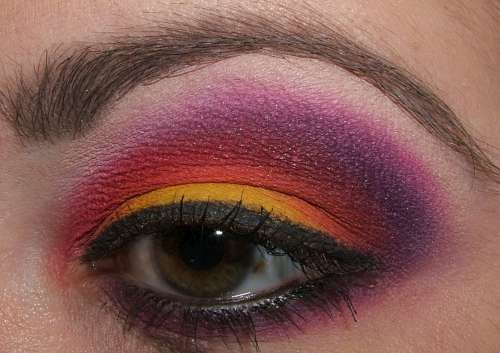Look: Meow Sparkle Blues
Posted by Heather | Filed under Blue, Chanel, Fyrinnae, Guerlain, Looks, MAC, Make Up For Ever (MUFE), Meow
Fyrinnae and Meow make some amazing blues!
For this look I used:
- Eyes: NARS Eyeshadow Primer (primer), Fyrinnae Pixie Epoxy (base), Meow Blitzen (inner lid), Meow In-Laws (middle lid), Meow Sardonic (outer lid & crease), Fyrinnae Marshmallow Puffs (highlight), MAC Signature Blue Superslick Liquid Liner (upper lashline), Guerlain Blue Kohl (waterline), MUFE Smokey Lash mascara
- Cheeks: MAC Briar Rose Beauty Powder Blush
- Lips: Chanel Glossimer #122
See more pictures!! Read the rest of this entry »
Look: My #1 Favorite
Posted by Heather | Filed under Blue, Brown, Chanel, Guerlain, Looks, MAC, Make Up For Ever (MUFE), Meow, Red/Maroon, Smokey
No kidding, I think I’ve worn this exact look like 10 times already! I love it so much. It’s sparkly, duochrome, shiny, bold, and very ME! I have so much makeup, that it is rare for me to do the same look even twice with the same shadows. Sure, I do the same types of gradients or color combos, but rarely with the exact same products. This is my exception. The shadow part is seemingly easy, because it’s basically 2 colors with a highlight. However, foiling loose shadows is challenging for me - especially at the top where I need it to blend out and not have a harsh line. This time, I got it right!
For this look I used:
- Eyes: NARS Smudge Proof Eyeshadow Primer, MUFE Star Powder #955 (applied wet to lid), Meow Sardonic (applied wet to crease & above crease), Sugarpill Lumi (highlight), MUFE Aqualine 0L (upper lashline), MAC Undercurrent Pearlglide liner (upper lashline over black), Guerlain Loose Eye Kohl #3 Blue (waterline), MAC Haute & Naughty mascara
- Cheeks: MAC Sun & Moon Mineralize blush
- Lips: Chanel Glossimer #122
See more pictures!!! Come on…you kinda have to since this is my FAVORITE look!!! :-) Read the rest of this entry »
Nails: Ozotic Pro 505
Posted by Heather | Filed under Nails, Ozotic Pro
Rainbows of color in epic proportions. Ozotic Pro colors are only available in Australia, and these duo (multi) chromes are actually being discontinued. I guess it’s something to do with the pigments no longer being made, because it cannot be for lack of sales or love for this type of polish. All of these pictures are of the same polish: #505. Some are taken with the flash, and some without. Different colors come out in different lights. Pinks, blues, purples, greens…you’ll see every color in there. This is two coats over black (or navy blue…can’t recall). The polish is sheer, and must be layered over a darker color to see the effect.
Amazing, isn’t it?! See more pictures!! Read the rest of this entry »
Look: Blurple
Posted by Heather | Filed under Blue, Looks, MAC, Purple, Urban Decay
I believe most of these colors are from the MAC Liberty of London collection, which was a while ago. I’m totally loving this blue and purple blending together :-)
For this look I used:
- Eyes: UDPP Eden (primer), Mac Suave Intentions (inner lid), MAC Satellite Dreams (middle lid), MAC Contrast (outer lid & crease), MAC Almond Icing (highlight), MAC Mystery Kohl Power (upper lashline), UD 24/7 Binge (lower lashline), Chanel Inimitable mascara
- Cheeks: MAC Azalea Blossom
- Lips: MAC English Accents lipglass
See more pictures!!! Read the rest of this entry »
Swatches & Review: High Voltage Lip Whips
Posted by Heather | Filed under High Voltage, Lips, Product Info, Reviews, Swatches
High Voltage Cosmetics makes more than just eyeshadows. These are lip whips: very opaque glosses in a squeeze tube. They have a slight mint scent and are non-sticky. I love that a little bit goes a long way with these - you really have to apply them with a lip brush (especially the darker shades). The colors are gorgeous and the formula is so silky smooth. Sadly, her ingredient supplier has discontinued some of the key ingredients in these, so Jasmine will be phasing these out. But not to worry! She has several left, and she is always creating new things that I cannot wait to try. Ok, on to the swatches! (Sorry for the messy towel background…that was my swatching towel, and some pigments got on it.)
 Top Row: Talk Talk, Slow Jam, Life of the Party
Top Row: Talk Talk, Slow Jam, Life of the Party
Bottom Row: Little Misfit, Kashmir, Sour Candy
 Top Row: Talk Talk, Slow Jam, Life of the Party
Top Row: Talk Talk, Slow Jam, Life of the Party
Bottom Row: Little Misfit, Kashmir, Sour Candy
See close-ups and swatches! Read the rest of this entry »
Look: Irredescent Pigments
Posted by Heather | Filed under Blue, Brown, Looks, MAC, Red/Maroon
I ♥ iridescent pigments. Duochrome stuff steals my heart every time. Although MAC pigments are not my favorite type of pigment, I have to admit that they make some amazing, incredible duochromes. I need more!!!! :-)
For this look I used:
- Eyes: NARS Eyeshadow Primer, MAC Blue-Brown pigment (inner & middle lid), MAC Teal pigment (crease & above crease), MAC Dark Blue Green pigment (crease), MAC White Gold pigment (highlight), MAC Mystery Kohl Power, MAC Opulash
- Cheeks: Bobbi Brown Nectar Shimmer Brick + MAC Marine Life highlight powder
- Lips: NARS Luster lipgloss
See more pictures!! Read the rest of this entry »
Look: Ode to Brian Kelly
Posted by Heather | Filed under Blue, Green, Looks, MAC, Make Up For Ever (MUFE), Sugarpill, Yellow
I love seeing looks that inspire me or ones that I love so much that I just MUST recreate. This look is based off of the ever-so-talented Brian Kelly (aka Cosmetic Viking) Look. I love his looks (and I really love his tweets!). Sadly, this isn’t a 100% complete look (since I didn’t do lips), but I really liked how it came out. There is NO GREEN used in this look! I know, right?! It’s all that wonderful yellow and blue blended together. Yellow + Blue = Green…go figure haha! This is another Sugarpill exclusive!
For this look I used:
- Eyes: NARS Smudgeproof Eyeshadow Primer, MAC Painterly PP (base), Sugarpill Buttercupcake (lid), Sugarpill Afterparty (crease & above), Sugarpill Tako (highlight), MUFE 0L Aqua Liner (upper lashline), UD 24/7 Flipside (waterline), MUFE Smokey Lash mascara
- Cheeks: MAC The Perfect Cheek
- Lips: au natural (aka nothing!)
See more pictures! Read the rest of this entry »
Look: UD Naked Look #2
Posted by Heather | Filed under Bronze, Brown, Chanel, Looks, MAC, NARS, Neutral, Pink, Urban Decay
Here is my second look using only the UD Naked Palette. It’s a little softer that the previous one, and a little on the pinker side. If you’re into nudes at all and don’t have the colors in this palette already, I highly recommend it! These shadows are really great!!
For this look I used:
- Eyes: NARS Smudgeproof Eyeshadow Primer, Urban Decay Naked Palette: Sin (inner lid), Toasted (middle lid), Hustle (outer lid), Creep (crease), Virgin (highlight), UD Zero (liner), MAC Opulash mascara
- Cheeks: Chanel Rose Temptation JC + MAC Smooth Merge MSF
- Lips: NARS Oasis lipgloss
See more pictures!! Read the rest of this entry »
Look: UD Naked Look #1
Posted by Heather | Filed under Bobbi Brown, Bronze, Brown, Gold, MAC, Urban Decay
There’s so much Urban Decay Naked Palette talk lately that I thought I’d post two looks I did using only the colors in the palette. Here is the first one!
For this look I used:
- Eyes: NARS Smudgeproof Eyeshadow Primer, Urban Decay Naked Palette: Half Baked (inner lid), Smog (middle lid), Dark Horse (outer lid & crease), Virgin (highlight), Bobbi Brown Chocolate Shimmer Ink (upper lashline), Urban Decay Whiskey (waterline), MAC Opulash mascara
- Cheeks: MAC Gold Deposit Mineralized Skin Finish
- Lips: MAC 4N lipglass
See more pictures! Read the rest of this entry »
Look: Anti V-Day?
Posted by Heather | Filed under Lips, Looks, MAC, Orange, Pink, Purple, Red/Maroon, Sugarpill, Yellow
To make myself clear, I will never be anti V-day (Valentine’s Day). How could I?! It’s my birthday!!! I understand why some people are, but I definitely consider myself lucky…even if I didn’t have a Valentine growing up, I still felt special because it was my birthday. My dad would get me, my sister, and my mom corsages to wear for the day, we’d go out to dinner (my choice), and I would always be my parents’ special Valentine :-) My mom likes to tell the story that I didn’t understand that the class wasn’t having a party on Valentine’s Day for me/my birthday until I was like 6 (whoops! hahaha). Well now that I’m married, I have a Valentine for life, and couldn’t be happier about that.
So now the reason for this title…GlamourDollsEyes is having a contest on Facebook for the best “Anti V-Day” Look. So this is going to be my entry. When I saw this contest, I knew this was the look I needed to enter…it’s really kinda anti-me. Sorta like my alter ego…bright eyes, bold lip, tossed hair, a little sad…a bad-girl kind of look for me. ;-) I do not yet have any Glamourdolleyes eyeshadows, but I am dying to try some!!
For this look I used:
- Eyes: NARS Smudgeproof Eyeshadow Primer, MAC Painterly PP (base), Sugarpill Buttercupcake (bottom middle of lid), Sugarpill Flamepoint (crease), Sugarpill Love+ (above crease), Sugarpill Poison Plum (outer lid & lower lashline), Sugarpill Dollipop (brow bone & lower lashline), Sugarpill Tako (highlight), MUFE Aqua Eyes 0L liner (upper lashline & waterline), MUFE Smokeylash mascara
- Cheeks: MAC Briar Rose Beauty Powder Blush
- Lips: Fyrinnae Meerkat (loose shadow mixed with MAC clear lipglass)
See more pictures!! Read the rest of this entry »




















 FOLLOW ME ON TWITTER
FOLLOW ME ON TWITTER